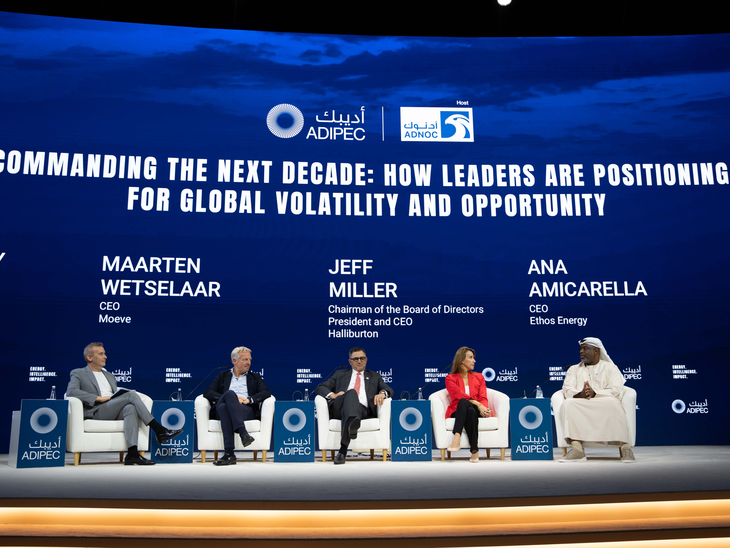
 ADIPEC 2025
ADIPEC 2025
Global finance leaders discuss the new era of energy investment defined by pragmatism, diversification and strategic capital allocation
Press Office
Day 3 of ADIPEC 2025 concluded on 5 November with a resounding call to action for global financiers, policymakers, and energy leaders to accelerate investment in energy and infrastructure. Against the backdrop of high-level dialogue, the event spotlighted the urgent need for scalable capital deployment to meet rising energy demand.
With over US$3.3 trillion in global energy investment projected this year, ADIPEC reinforced its role as a catalyst for unlocking strategic partnerships and financial innovation across the energy value chain.
Taking place from 3-6 November, ADIPEC 2025 is convening financiers, policymakers and industry leaders to unlock the capital, tools and frameworks needed to transform global energy systems at speed and scale.
With energy security and affordability shaping investment decisions, and challenges persisting in emerging economies such as high borrowing costs, investment risks, limited creditworthy off-takers, and regulatory uncertainty, ADIPEC 2025’s Finance & Investment programme has been showcasing how redirected capital flows, evolving portfolios, and inclusive frameworks are strengthening resilience, competitiveness, and long-term decarbonisation.
Financing based on sound fundamentals, not short-term market shifts
In the session titled ‘Commanding the next decade: how leaders are positioning for global volatility and opportunity’, experts discussed long-term financial planning in a dynamic energy landscape, recommending fundamental-based decisions over reactive policy.
In the session, Maarten Wetselaar, CEO, Moeve, said: "You always have to invest based on fundamentals rather than on the latest policy change, whether it’s in Europe or the US or wherever in the world, because it takes so long to build energy investments that it’d be a bit risky to respond to the latest coming out of wherever in the world.”
Advancing global goals with decarbonisation investment
While the global energy industry looks to bring more energy streams online, sector experts advised a continued focus on decarbonising our existing energy system, to ensure long-term energy sustainability. A key part of that is reducing carbon and methane emissions, for which greater investment in technology innovation is required.
During a session titled ‘Methane emissions reduction: a decarbonisation priority’, Zubin Bamji, Manager Energy and Extractives Global Department, The World Bank Group, spoke about the critical role of financing in addressing methane emissions reduction. “Finance is one of the key missing elements in this ecosystem of methane and flaring decarbonisation, and the World Bank would like to play a role in that gap. The idea was to provide catalytic funding that is needed in many developing countries or emerging economies for them to recognise that there is actually an opportunity here.”
His view was supported by Khalid Bin Hadi, Managing Director, UAE, Siemens Energy, who linked the ability to advance decarbonisation to investment in innovation, saying: “For me, innovation is about solving problems. We need to apply innovation, we need to scale innovations, and that will require three elements: investments, industry partnerships, and true partnership.”
Myriad opportunities for energy and infrastructure investment in emerging markets
Several rapidly developing emerging market economies are looking to connect capital to resource extraction projects, which is often dependent on cross-sector and cross-border collaboration.
In the session titled ‘Strengthening Nigeria and NNPC’s position in global energy markets’, Bayo Bashir Ojulari, Group CEO of NNPC, discussed how Nigeria’s booming energy sector is approaching development. He said: “With production comes the requirement for investment, so we’re focusing on collaboration that starts with the baseline, making our existing partnerships as effective and sharp as possible, while also discussing new partners, new investments, and new opportunities.”
The importance of sound, stable, and clear policy in attracting and unlocking finance and investment was another message reiterated by speakers at ADIPEC 2025.
Charlotte Wolff-Bye, Chief Sustainability Officer, PETRONAS, summarised the message succintly when she said: “Business works well when we have a line of sight of clear regulation, clear policy, line of sight, all of this. We like that. Most of us operate in many countries. We enjoy that. Investment will flow. The inability to regulate some of these policy commitments, perhaps lack of enforcement, doesn’t help, actually.”
ADIPEC 2025 continues through 6 November, with upcoming sessions addressing hydrogen, LNG, digitalisation, and the future of energy systems. Across four days, the conference is turning dialogue into delivery, catalysing partnerships and showcasing solutions that drive inclusive, sustainable progress at speed and scale.
Contact us